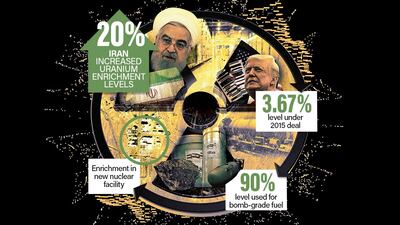Iranian Foreign Minister Javad Zarif on Sunday dismissed a claim by France that Tehran was in the process of building up its nuclear weapons as "absurd nonsense".
The French accusation came on Saturday, the same day Iran's Islamic Revolutionary Guard Corps fired ballistic missiles in the Indian Ocean, ending a two-day military exercise.
Acting on orders from President Hassan Rouhani, Iran announced this month that it was pressing ahead with plans to enrich uranium to 20 per cent fissile strength at its new underground Fordow nuclear plant.
In doing so, Iran accelerated its breaches of the 2015 nuclear deal with world powers to contain its nuclear ambitions.
Mr Zarif criticised French Foreign Minister Jean-Yves Le Drian, and France, Germany and Britain for failing to enforce the agreement since 2018, when US President Donald Trump abandoned it and restored harsh economic sanctions on Iran.
He said the pact was still alive only because Iran had maintained it.
Mr Le Drian said it was important to "tell the Iranians that this is enough" and bring Iran and the US back into the accord.
"The Trump administration chose what it called the maximum pressure campaign on Iran. The result was that this strategy only increased the risk and the threat," Mr Le Drian told Journal du Dimanche.
The nuclear deal has been largely in tatters since Mr Trump withdrew the US.
The agreement limited Iran’s uranium enrichment levels to 3.67 per cent.
The resumption of enrichment to 20 per cent brings Tehran closer to developing the capacity to produce a nuclear weapon, but still far from the 90 per cent levels used for bomb-grade fuel.
Iran claims its nuclear programme is for peaceful purposes.
The decision to bolster uranium enrichment came after the assassination in November of Iran’s top nuclear scientist, Mohsen Fakhrizadeh.
It coincided with the first anniversary of the assassination of IRGC commander Qassem Suleimani in a US drone strike in Iraq on January 3 last year.
The official announcement came a few days before the inauguration of US president-elect Joe Biden.
Mr Biden’s team expressed conditional willingness to return to diplomacy with Tehran.
They said that under a Biden administration, the US would return to the deal if Iran resumed strict compliance with its terms.
Mr Biden's team criticised Mr Trump’s “maximum-pressure” policy.
“All of the promises that we got from this administration about how their policy was going to get us a better deal on the nuclear front, was going to stop Iran's malign behaviour across the region, those promises did not bear out," Jake Sullivan, Mr Biden’s national security adviser, told CNN on January 3 this year.
"In fact, Iran continues to act in ways that are at odds with the interests of the United States and its allies, and nothing about the action that was taken one year ago today set that back.”
Iran said sanctions must be lifted before it reversed its nuclear breaches.
But Mr Le Drian said that even if both sides were to return to the deal, it would not be enough.
"Tough discussions will be needed over ballistic proliferation and Iran's destabilisation of its neighbours in the region," he said.



